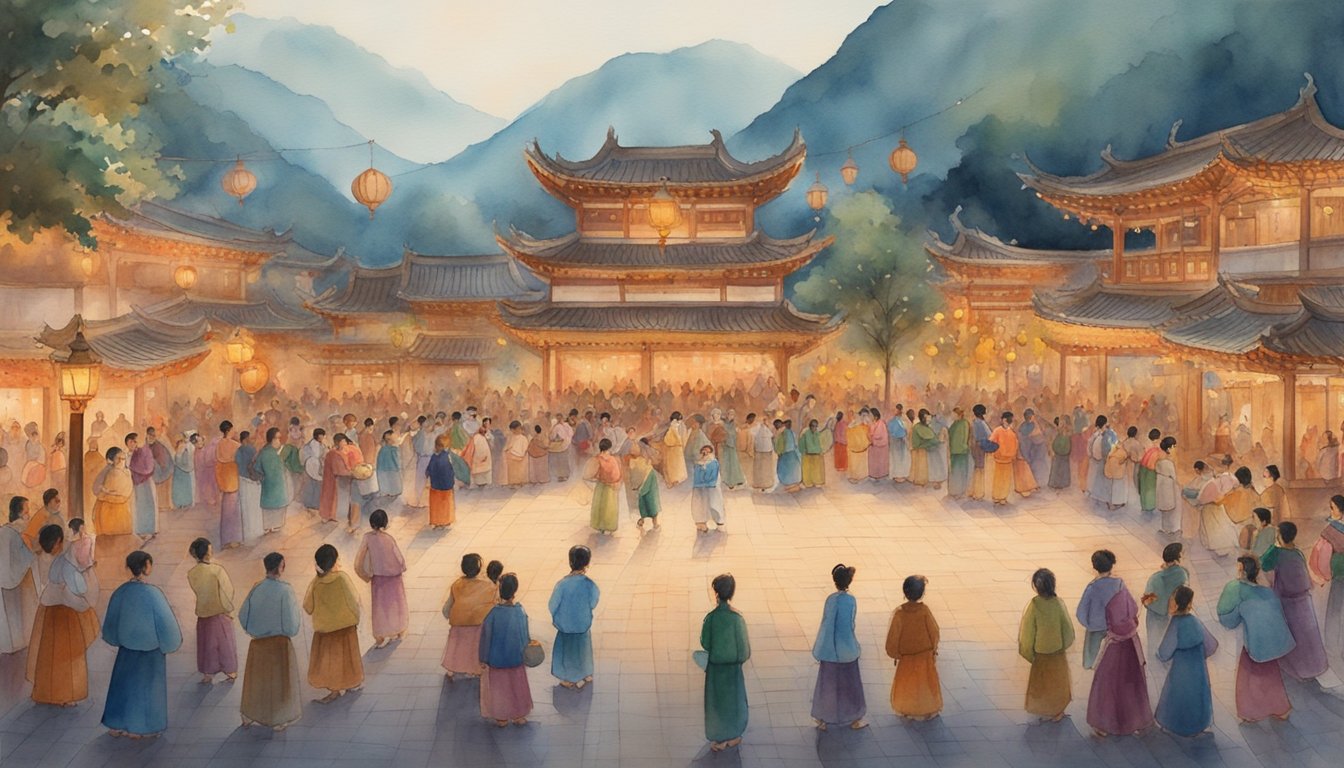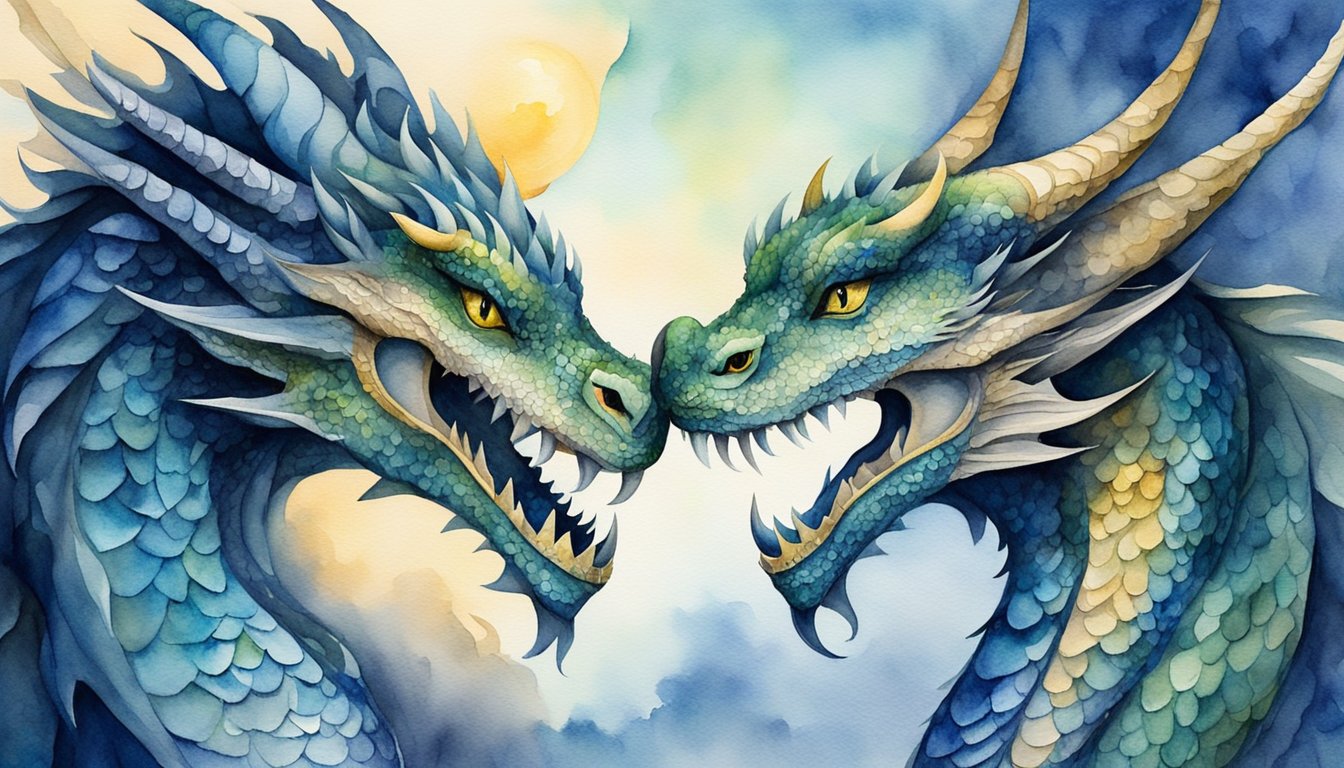Understanding the Year of the Dragon
The Year of the Dragon is a significant time in the Chinese zodiac that comes once every twelve years and is associated with strong characteristics and an element from the astrological system.
Significance in Chinese Zodiac
In the Chinese zodiac, the Dragon stands as one of the twelve animals that appear in the 12-year cycle. It is unique as it is the only mythical creature in the lineup, which has led to a high regard for it in Chinese culture. Each zodiac is also associated with one of the five elements, creating a 60-year cycle as the elements cycle through the animal signs. For example, there are Wood Dragons, Fire Dragons, and so forth. This system of astrological signs is based on the lunar calendar and plays a significant role in Chinese astrology.
Historical Dragon Years
The historical Dragon years are those that fall within the Dragon’s place in the 12-year cycle. They include years like 2012, 2000, 1988, etc., and moving forward, 2024 is also a Dragon year. Those born in the Year of the Dragon are said to have certain influenced characteristics due to the dominance of the Dragon’s qualities during their birth year. The Dragon cycles are further refined by the lunar calendar, which assigns an element to each year, adding another layer of traits to those born in these times.
Characteristics of the Dragon
The Dragon is often seen as the most auspicious and powerful sign in Chinese astrology. People born in the Year of the Dragon are thought to exhibit traits like confidence, intelligence, and enthusiasm. They are also seen as enterprising, flexible, and passionate in their pursuits. Each Dragon Year also corresponds to one of the five elements, which modifies these characteristics further. For instance, a Wood Dragon is thought to be cooperative and broad-minded, whereas a Fire Dragon might display leadership and dynamism.
By understanding the Year of the Dragon, one can gain insight into how this zodiac sign influences those born under it and the cultural importance it holds within the context of the Chinese zodiac system.
Cultural Impact and Celebrations

The Year of the Dragon is not only a time of celebration but also a profound cultural emblem in Chinese society, marked by vibrant traditions and global festivities.
Dragon in Chinese Mythology and Culture
In Chinese mythology, the dragon stands as a powerful symbol of strength, good fortune, and imperial authority. Unlike Western dragons, which are often considered malevolent, the Chinese dragon is benevolent and wise. Chinese New Year, or the Spring Festival, sees the dragon take center stage in parades as a sign of luck for the coming Lunar New Year. The dragon is so ingrained in Chinese culture that its influence extends to various aspects of life, including art at the National Museum of Asian Art and public consciousness both within and beyond China.
Traditional Celebrations and Festivals
During the Dragon Year, festivities such as the renowned Dragon Boat Festival showcase the cultural significance of the dragon. Boats adorned with dragon motifs race in waterways, commemorating the ancient poet Qu Yuan. This event, highlighted by the Smithsonian, captures the essence of tradition and community spirit. Additionally, Chinese New Year celebrations are replete with dragon dances, with performers moving to the rhythm of drums to bring good luck and prosperity.
Global Influence
The dragon’s majestic image has transcended Chinese borders, influencing celebrations in countries like Vietnam, Cambodia, and Thailand. These nations host their own Lunar New Year festivities, with the dragon playing a prominent role. As a testament to the widespread cultural exchange, dragon symbolism can be found in global parades and festivals, establishing the dragon as a shared symbol of cultural festivity across Asia and the world.
Dragon-themed festivities have reached global audiences, becoming an integral part of cultural celebrations that acknowledge the rich tapestry of Chinese heritage.
Personal Attributes and Compatibility

The Year of the Dragon is steeped in symbolism and significance within Chinese astrology, imbued with qualities like strength and fortune. Personal attributes unique to those born under this zodiac sign intertwine with compatibility dynamics, shading interpersonal relationships and affecting perceived luck.
Traits of Individuals Born in Dragon Years
Individuals born in Dragon years are often seen as enthusiastic, intelligent, and determined. Dragons are thought to possess a natural charisma and confidence that draws people to them. Seen as the embodiment of power and vitality, these people are considered lucky, embodying prosperity and success. Their corresponding element can affect their personality further—such as Wood Dragon signifying creativity and openness.
Dragon Compatibility with other Zodiac Signs
Compatibility between zodiac signs is a cornerstone of Chinese astrology, with each animal sign having more favorable relationships with certain signs over others. Dragons generally harmonize with Monkey and Rat natives – this trio forms an alliance based on mutual respect and similar ambitions. On the other extreme, Dragons find it hard to see eye to eye with Dog individuals, as they seem to have clashing ideals and priorities.
Dragon in Modern Astrology and Horoscopes
In modern contexts, the Dragon’s influence spreads to horoscopes, providing daily insights influenced by the transitional interplay of yin and yang energies. Age-old beliefs adapt to present times, suggesting lucky numbers or lucky colors believed to bring fortune to Dragons. Discussions about love compatibility or career success arise often in horoscopes, reflecting age-old traditions applied to contemporary life.

